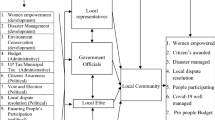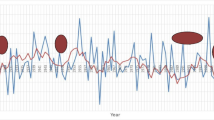Abstract
Most developing countries have responded to the 2002 World Summit on Sustainable Development (WSSD) call to implement Integrated Water Resources Management (IWRM) in their national water policy to reach water sustainability and socioeconomic welfare. Despite adopting the principles of the IWRM into the Lake Chad Basin Commission's water charter, the Lake Chad basin experiences a massive humanitarian crisis driven by the Lake's shrinkage. Socioeconomic and demographic data of 582 households were collected and semi-structured interviews with key informants with a stake in the Lake Chad Basin resources were conducted in Chad to review the water governance and its impacts on the implementation of the Integrated Water Resources Management principles. This research found that the lack of coordinated efforts between the Lake Chad Basin Commission and its stakeholders resulted in weak policies and regulations to promote public and private participation, education, and water stewardship in the Lake Chad Basin. The findings of this research highlight the urgency of strengthening the water governance in developing countries to meet the sixth Sustainable Development Goal of the 2030 Agenda for Development.


Similar content being viewed by others
Data availability
Data used for this study are available from the corresponding author on request.
References
Adaawen S, Rademacher-Schulz C, Schraven B, Segadlo N (2019) Chapter 2 Drought, migration, and conflict in sub-Saharan Africa what are the links and policy options? Curr Dir Water Scarcity Res 2:15–31
Afshar A, Khosravi M, Molajou A (2021) Assessing adaptability of cyclic and non-cyclic approach to conjunctive use of groundwater and surface water for sustainable management plans under climate change. Water Resour Manage 35:3463–3479
Akhmouch A, Clavreul D, Glas P (2018) Introducing the OECD Principles on Water Governance. Water Int 43:5–12
Balram S, Dragicevic S (2005) Attitudes toward urban green spaces: integrating questionnaire survey and collaborative GIS techniques to improve attitude measurements. Landsc Urban Plan 71:147–162
Bdliya H, Bloxom M, Hassan DR, Bdliya H (2007) Transbound diagnostic analysis of the Lake Chad Basin. 22: 334
Bertule M, Glennie P, Bjornsen P, Llyod J, Kjellen M, Dalton J, Harlin J, (2018). Monitoring Water Resources Governance Progress Globally: Experiences from Monitoring SDG Indicator 6.5.1 on Integrated Water Resources Management Implementation. Water.
Bielsa J, Cazcarro I (2015) Implementing integrated water resources management in the Ebro River Basin: From Theory to Facts. Sustainability 7:441–464
Biswas A (2008) Integrated water resources management: is it working? Int J Water Resour Dev 5–22
Blanchon D (2011) Les transferts interbassins: l’expérience sud-africaine. Passages 166:44–48
Bonifica (1982) Transaqua An idea for the Sahel. Report No.1 Rome: Bonifica S.p.A.. and I.R.I Italstat
Councils of Ministers (2003) Integrated plan for Chad's water development and management 2003–2020. UNDESA
Crane A, Matten D (2004) Business ethics: a European perspective. Oxford University
Desa UN (2019) World population prospects 2019: highlights. Population Division, New York
Fulazzaky MA (2014) Challenges of integrated water resources management in indonesia. Water 6:2000–2020
Giordano M, Shah T (2014) From IWRM back to integrated water resources. Int J Water Resour Dev 37(6):364–376
Global Water Partnership (2000) Integrated Water Resources Management Global Water Partnership Technical Advisory Committee (TAC) Global Water Partnership. Retrieved from www.gwpforum.org
Global Water Partnership (2009) A handbook for integrated water resources management in basins
Gordon R (1975) Interviewing: strategy, techniques and tactics. Dorsey Press, Illinois
Hassing J, Ipsen N, Jonch-Clausen T, Larsen H, Lindgaard-Jorgensen P (2009) Integrated water resources management in action. UNESCO, France
Hillier A, Cannuscio C, Griffin L, Thomas N, Glanz K (2012) The value of conducting door-to-door surveys. Int J Soc Res Methodol 17(3):285–302
Jenkins M (2017) The Impact of corruption on access to safe water and sanitation for people living in poverty. U4. Anti Corruption Resource Center
Jonch-Clausen T (2004) Integrated Water Resources Management (IWRM) and Water Efficiency Plans by 2005, Why, what and how? Stockholm: Global Water Partnership
Korten D (1987) Third generation NGO strategies: a key to people-centered development. World Dev 15(1):145–159
Ladel J (2007) Gestion Integree des ressources en eau du bassin transfrontalier du lac Tchad. Final report. N'Djamena: CBLT, European Union
LCBC (2017) Mandate and missions. Retrieved 05 01, 2017, from cblt.org: www.cblt.org/en/lake-chad-basin
Magrin G (2016) The disappearance of Lake Chad: history of a myth. J Polit Ecol 23:204–222
Malena C, Forster R, Singh J (2004) Social accountability: an introduction to the concept and emerging practice. Soc Dev 76:443
Margaret PA, Liermnann AC, Nisson C, Florke M, Alcamo J, Lake P, Bond N (2008) Climate change and the world’s river basins: anticipating management options. Front Ecol Environ 22:3345
Mcdonnell RA (2008) Challenges for integrated water resources management: how do we provide the knowledge to support truly integrated thinking? Int J Water Resour Dev 24–1:131–143
Mehta A, Bolding A, Derman B, Hove T, Koppen B (2014) The politics of IWRM in Southern Africa. Int J Water Resour Dev 30:528–542
Meissner R, Inga J (2016) Theorising complex water governance in Africa: the case of the proposed Epupa Dam on the Kunene River. Int Environ Agreements 16(1):21–48
Merrey D, Dreschsel P, Sally H, De Vries F (2005) Integrating “ livelihoods” into Integrated Water Resources Management: taking the integration paradigm to its logical next step for developing countries. Reg Environ Change 5:197–204
Moses A, Nyongesa D, Neyole E, Masinde E (2011) “Effluent discharge by Mumias Sugar Company in Kenya: an empirical investigation of the pollution of River Nzoia Sacha. Sacha J Environ Stud 1(1):1–30
Nicol A, Odinga W (2016) IWRM in Uganda-progress-centered development. Water Alternatives 627–643
Oki T, Quiocho R (2020) Economically challenged and water scarce: identification of global populations most vulnerable to water crises. Int J Water Res Devel 36:416–428
Okpara U, Stringer L, Dougill A, Bila A (2015) Conflicts about water in Lake Chad: are environmental, vulnerability and security issues linked? Prog Dev Stud 15(4):135–149
Pahl-Wostl C, Sendzimir J, Jeffrey P, Aerts J, Berkamp G, Cross K (2007) Managing change toward adaptive water management through social learning. Ecol Soc 12(2):30
Philips R (2003) Stakeholder legitimacy. Bus Ethics Q 13(1):25–41
Pulido-Velazquez M, Ward F (2016) Comparison of Water Management Institutions and Approaches in the United States and Europe—What Can We Learn From Each Other? Ziolkowska, & J. Peterson, Competition for Water Resources. Elsevier, USA
Qureshi A, Mahessar A, Leghari M, Lashari B, Mari F (2015) Impact of releasing wastewater of sugar industries into drainage system of LBOD, Sindh, Pakistan. Int J Environ Sci Dev 6(5):381–386
Rahaman M, Varis O (2005) Integrated water resources management: evolution, prospects and future challenges. Int Water Res Sustain Sci, Pract Policy 1(1):15–21
Salkida A (2012) Africa’s vanishing Lake Chad. Africa Renewal
Saravanan S, McDonald G, Mollinga P (2009) Critical Review of Integrated Water Resources Management: moving beyond polarised discourse. NRF
Singh A, M'mayi P (2006) Atlas of a changing environment. UNEP, Nairobi
Swatuk L (2005) Political challenges to implementing IWRM in Southern Africa. Phys Chem Earth 30:872–880
Tortajada C (2014) IWRM revisited: from concept to implementation. In Int J 30(3):361–363
UNEP (2004) Global international waters assessment lake chad basin, GIWA regional assessment 43. University of Kalmar on behalf of, Kalmar-Sweden
UNESCO (2017) 15 The United Nations World Water Development Report 2017: Wastewater: the untapped resource. Paris
United Nations (2018) The sustainable development goals report. United Nations, New York
United Nations (2019) The sustainable development goals report 2019. United Nations, New York
Wahili D (2019) Lac Tchad : Les pécheurs pris en otage par les agents de la brigade des eaux et forêts. Retrieved January 25, 2020, from Alwihdainfo: https://www.alwihdainfo.com/Lac-Tchad-Les-pecheurs-pris-en-otage-par-les-agents-de-la-brigade-des-eaux-et-forets_a70871.html
WHO, UNICEF (2019) Progress on household drinking water, sanitation and hygiene 2000–2017: Special focus on inequalities. New York
Yunama B et al (2017) Climate change and lake water resources in sub-saharan Africa: case study of lake chad and lake victoria. Niger J Technol 36(2):648
Acknowledgements
The authors would like to thank all the Lake Chad Basin stakeholders and the participants for contributing to the data collection. We thank Dr. Tara Deubel, Associate Professor at the Department of Anthropology (University of South Florida) for her contribution to the design of this study. Finally, We also thank the blind reviewers for taking the time to review the manuscript and making very useful comments and suggestions.
Funding
This research did not receive any specific grant from funding agencies in the public, commercial, or not-for-profit sectors.
Author information
Authors and Affiliations
Contributions
All authors contributed to the study conception and design. Data collection and analysis were performed by Nodjidoumde Mbaigoto. Nodjidoumde Mbaigoto also wrote the first draft manuscript, which was reviewed and commented on by Kamal Alsharif and Shawn Landry. All authors read and approved the final manuscript.
Corresponding author
Ethics declarations
Conflict of interest
The authors declare that they have no conflict of interest.
Ethical approval
This study was conducted in compliance with Ethical Standards and approved by the University of South Florida Institutional Review Board (IRB) (Pro#00039520).
Consent to participate
A signed consent form was required for each participant of this study.
Consent to publish
Authors give their permission to publish.
Additional information
Publisher's Note
Springer Nature remains neutral with regard to jurisdictional claims in published maps and institutional affiliations.
Rights and permissions
Springer Nature or its licensor (e.g. a society or other partner) holds exclusive rights to this article under a publishing agreement with the author(s) or other rightsholder(s); author self-archiving of the accepted manuscript version of this article is solely governed by the terms of such publishing agreement and applicable law.
About this article
Cite this article
Mbaigoto, N., Alsharif, K. & Landry, S. An assessment of the degree of the implementation of the integrated water resources management principles in the Lake Chad Basin: the case of the Republic of Chad. Sustain. Water Resour. Manag. 9, 118 (2023). https://doi.org/10.1007/s40899-023-00894-3
Received:
Accepted:
Published:
DOI: https://doi.org/10.1007/s40899-023-00894-3




